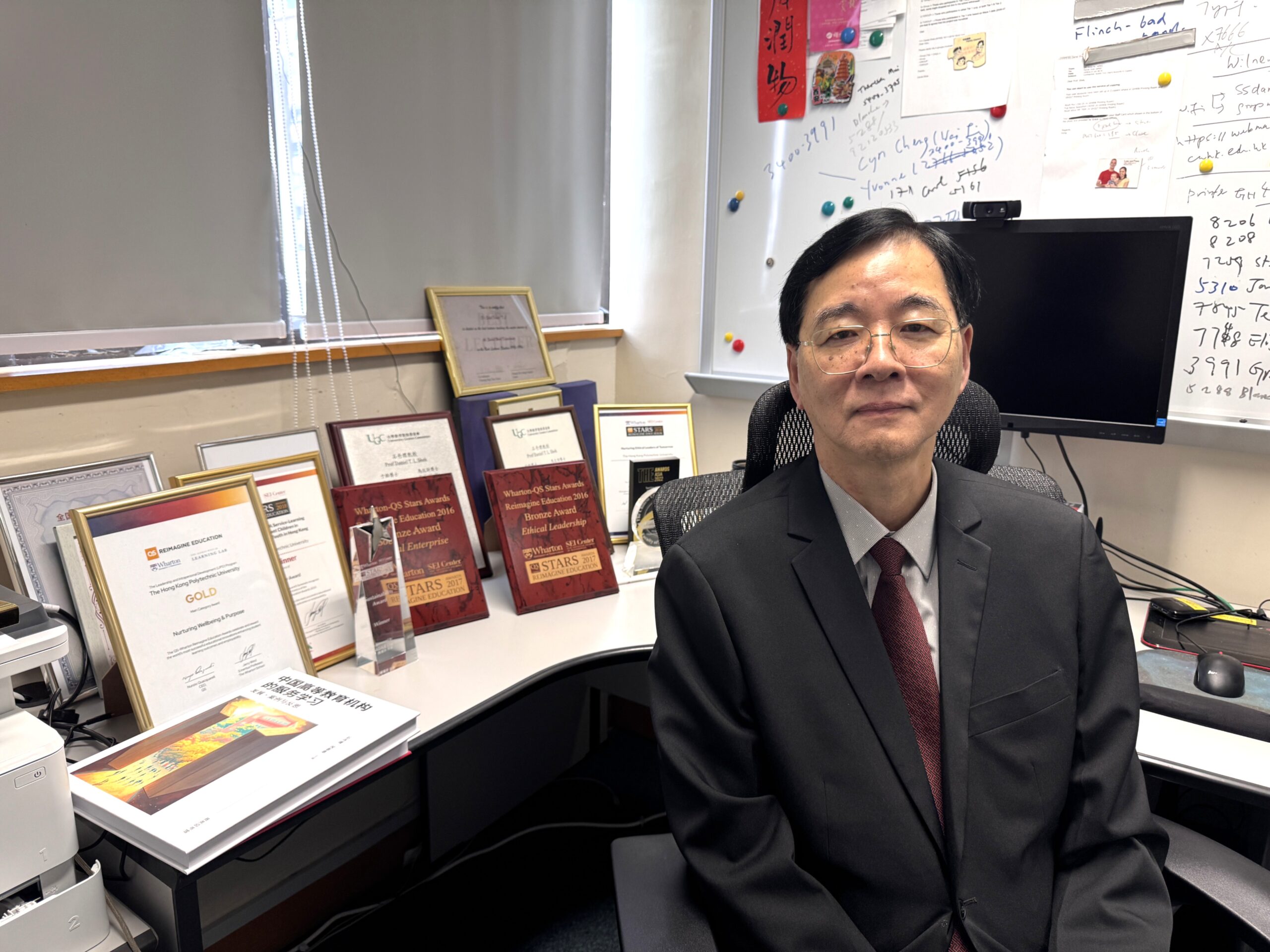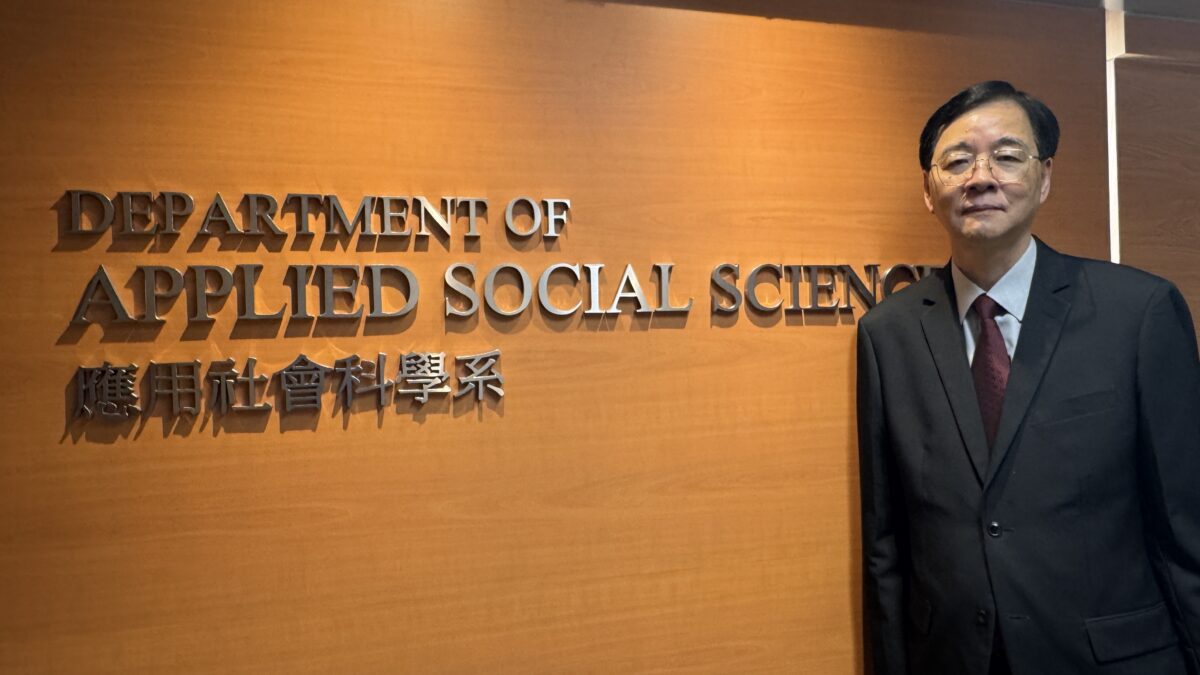A Psychologist with the Heart for Social Service
Professor Daniel T L Shek recalled the days when he had to collect drinking water from the well after school while his mother fabricated clothes and grew vegetables for the family of six following the decease of his father. The hard times during teenage turned out to be a blessing in disguise as he and his siblings grew up to become professionals in the education and nursing sectors to serve people in need.
Today, as the PolyU Associate Vice President (Undergraduate Programme) as well as the Chair Professor of Applied Social Sciences, he is a seasoned educator whose teaching, research and community involvement encompass the themes of children and adolescent development, mental health, family, addiction, crime, spirituality and others. He has won various teaching awards including the UGC Teaching Award (2018), on top of publishing over 150 books and manuals on the topics, and serving on a number of government committees.
As a PhD graduate specialising in Psychology from the University of Hong Kong in 1987, he joined the academia and worked in four universities including the Chinese University of Hong Kong where he won his first two teaching awards. His experience as New Asia College’s Dean of Students and Dean of General Education proved to be most useful when he joined the Hong Kong Polytechnic University in 2009.
At PolyU, he continued to advocate service-learning and development of soft skills, as the university prepared for transition to four-year undergraduate curriculum. “Education is not only about acquiring knowledge; it is about character building. Even scientists need to learn about history and human civilisation to build character and distinguish the potential ethical risks of nuclear bombs, for instance.”
Pioneer of Service Learning
Leveraging the spirit of the P.A.T.H.S. to Adulthood, an enhancement scheme for junior secondary school students that he led for Jockey Club Charities Trust since 2005, Professor Shek applied his experience further to steer positive development among university students. At PolyU in 2010, he launched the Leadership and Intrapersonal Development Team (LIPD) to nurture personal and social competence with experiential learning via both compulsory and elective courses for all students in the university.
As a result, four courses with the aim to foster adversity quotient, emotional quotient, spiritual quotient, relationship, self-knowledge and service-learning were launched in PolyU on the eve of the 3-3-4 education reform in 2012. They were: 1) Tomorrow’s Leaders; 2) Service Leadership; 3) Service-Learning: Promotion of Child and Adolescent Development; and 4) Service-Learning: Service Leadership through Serving Children and Families with Special Needs.
“University students need to understand societal needs and give back to the society. Via our service-learning initiatives, participants enlighten students of selected secondary schools with lower academic standards in Hong Kong by introducing how David Beckham’s trajectory and kick speed can be explained by parabola and other mathematics principles. There are cross-boundary learning trips to rural and urban areas on Mainland China, during which PolyU students serve children of migrant labours under extreme heat of 40 degrees Celsius.”
Students’ positive feedback demonstrates that the initiatives are making impact and sowing seeds for the future. “A mainland student shared with us recently that the summer camp for secondary school students in 2016 had inspired him to set goals and work hard. He is still keeping all the handbooks and letters of the camp. We are most grateful to learn that he is now going to university.”
The learning trips are eye-opening experiences for PolyU students themselves. “A female student recalled in tears that an underprivileged boy on the mainland asked if she could share with him some of the meat she was having in her enriched meal plan. Another student was pleasantly surprised to learn that mainland students, contrary to stereotypes, are genuine and diverse. Many students, after visiting the energetic Huangpu CBD in Shanghai, were amazed at the vibrance in mainland cities.”
For some, the experience can be life-changing. “It happens every year that service learning transforms the academic or professional pursuits of certain students. For example, there are students of engineering or fashion design that switch to social work for postgraduate studies because of the inspiration.”
Now in its twelfth year, the offerings have attracted over 30,000 enrolments in total, including 2,000 freshmen every year. Over 4,000 students have participated in service learning. The outcome, collected systematically via pre-test and post-test surveys, interviews and focus groups, shows that students’ leadership ability, life satisfaction, empathy, determination, adversity quotients etc have all improved. The vast majority finds them thought-provoking, beneficial in promoting life reflection, self-awareness, ethical decision-making, self-confidence and the like.
The encouraging outcome is solidified as PolyU becomes the lead in Cross-strait, Hong Kong and Macau Service-Learning Education Network with members from close to 70 organisations. Moreover, major mainland universities such as Fudan University and Sichuan University are adopting similar approaches to widen the perspectives of their own students. Strong trust has been built between PolyU and their mainland counterparts to enable such large-scale collaborative projects for more than a decade.
Professor Shek and his team won the prestigious Reimagine Education Awards several times, with two Gold, one Silver and two Bronze awards, before being recognised by UGC Teaching Award.
“We do not aim to win awards. Rather, we need to strategically demonstrate the value of service learning so that universities continue to foster transferable skills among students. Without service learning, students, universities, and the society as a whole will be disadvantaged,” said Professor Shek who is the Li and Fung Endowed Professor in Service Leadership Education.
Concerns over Mental Health
Whereas some scholars focus on research, Professor Shek as an award-winning educator believes in combining teaching and learning with research output. He was one of the pioneers to conduct large-scale research on adolescent mental health two decades ago. For his current work on leadership and service-learning, he continues to publish outcomes of leadership training. He ranks third in China in the field of Psychology, according to Ranking of Top 1000 Scientists.
With substantial research on youths in Hong Kong and mainland China, he is particularly concerned about mental health after Covid. “Youth mental health is now in extremely poor conditions. There are increased cases of adolescent suicide,” he noted without hesitation. “Covid pandemic affects quality of life. Although school and cross-border activities have resumed, it does not mean ‘recovery’ for everyone. Just as heart attack needs to be prevented before it happens, negative mental well-being should be prevented before mental problems deteriorate.”
He explicates the issue in his paper Do Student Mental Health Problems Disappear Overnight in the Postpandemic Era? , which has then been highly cited by other scholars. A Harvard student, who had set up a student club during the pandemic to foster mental health, proactively contacted Professor Shek to express their shared concern about the importance of building resilience.
Having served as the University’s Associate Vice President (Undergraduate Programme) for twelve years, he helps to accomplish the university’s mission to advance students’ mental health and holistic development.
Call to Serve
To young people aspiring to be social scientists and scholars in the fields, he advises that they learn more about history and the society to find out about their real passions. As for himself, he reiterates that his Christian belief is closely related to his call to serve people and to love others. His humble beginning gives him the down-to-earth ability to understand and care for the underprivileged.
“Ultimately, all the work about mental well-being and youth development points towards improving people’s quality of life. As educators, we are not merely transmitting knowledge; we need to set good role models in character-building.”
As an educator, he walks the walk to put his words into actions.


